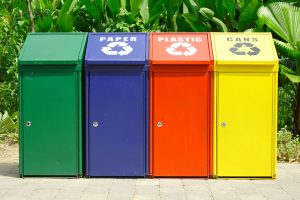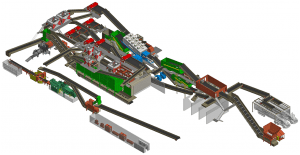
A shuttered Alabama facility that was built to separate recyclables from trash could reopen in October, and city leaders are leaning toward trying the mixed-waste approach again.

A shuttered Alabama facility that was built to separate recyclables from trash could reopen in October, and city leaders are leaning toward trying the mixed-waste approach again.
 Industry stakeholders have formed a state recycling organization in Ohio. The group aims to serve as a one-stop shop for business development and support services.
Industry stakeholders have formed a state recycling organization in Ohio. The group aims to serve as a one-stop shop for business development and support services.
 With China having recently shaken up export possibilities, industry leaders in the U.S. have amplified their calls for more domestic markets for recyclables. Two upcoming events aim to accelerate that process.
With China having recently shaken up export possibilities, industry leaders in the U.S. have amplified their calls for more domestic markets for recyclables. Two upcoming events aim to accelerate that process.
 More than 100 government and corporate recycling leaders convened in Chattanooga, Tenn. to assess where the recycling industry stands in terms of data collection and analysis, and to generate recommendations on what new measurement steps need to be taken.
More than 100 government and corporate recycling leaders convened in Chattanooga, Tenn. to assess where the recycling industry stands in terms of data collection and analysis, and to generate recommendations on what new measurement steps need to be taken.

Extended producer responsibility rose to the forefront of debate in Connecticut as a strategy to reduce packaging waste in line with state mandates. A committee tasked with advising lawmakers during the coming legislative session recently split on the strategy, but the majority advised against it.
 Keep America Beautiful, which runs America Recycles Day and other initiatives, is closing its Washington, D.C. office and consolidating staff in Connecticut. Two leaders from the organization’s recycling arm are exiting as part of the shift.
Keep America Beautiful, which runs America Recycles Day and other initiatives, is closing its Washington, D.C. office and consolidating staff in Connecticut. Two leaders from the organization’s recycling arm are exiting as part of the shift.

Credit: On Ter/Shutterstock
Municipal programs are often short on funds, and it’s easy for recycling outreach to fall on the back burner amid budget constraints. East Hartford, Conn. recently took action on the issue by partnering with a plastics industry initiative.

Credit: Nick Starichenko/Shutterstock
New York City is moving forward with a plan to shift the financial burden of garbage collection from taxpayers to ratepayers.

A rendering of the planned BHS recycling system in South Carolina.
Nine robots and seven optical sorters will operate at a mixed-waste processing facility coming to South Carolina. Meanwhile, a separate large mixed-waste MRF is progressing in Maine.

